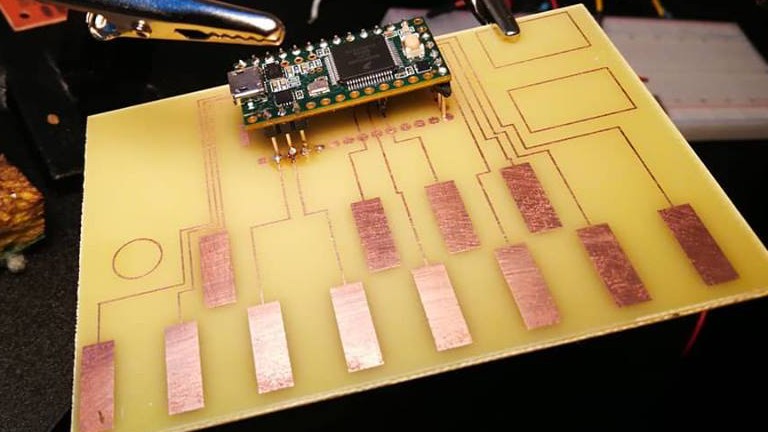[Michael Sobolak] has a penchant for pianos, concern for capacitive touch, and special sentiment for solid state. This alliterate recipe results in a DIY PCB piano that leaves out the levers and is barren of buttons unless you count the stock RESET button on the Teensy. A real stickler might point out that speakers have moving cones. Beyond these tangential parts, which have motionless options, it is an electronic instrument with no moving parts.
The heart of the project is a Teensy 3.2 which natively supports twelve capacitive touch sensors. The infamous demo board is mounted to a homemade PCB featuring twelve keys but is actually an incomplete octave plus another key one octave above the first. If you look sharp, you already noticed the missing and extra touchpads. PCB traces were made in Illustrator because if you have a familiar tool, you use what you know and you cannot argue that it works. The design was transferred to a copper board using the old magazine page trick that we love and reliable old ferric acid.
We couldn’t help but notice that the posts of the Teensy were soldered to the top of the board, rather than drilling through, IMT-style. Again, the results speak, even if there is room for improvement. Reportedly, there is a second version on the way which includes every expected key.
Via PJRC blog.
















Well it sounds a lot better than what I was expecting!
It’s just a (USB) MIDI keyboard. So it depends entirely on something else to produce the actual sound. Alternatively, the Teensy is quite capable of producing its own sound. Just need an amplifier circuit.
Given a limited number of inputs you can use a diatonic (white keys) scale and add just F sharp and B flat and be able to play in many keys and modes. This was used in most of the turn of the last century band organs. 3 left out of 12, one quarter savings with little missed.
Old pirates…
So cool to see this posted here! I made an updated version using the CapitativeSensor.h library for the C. I have two working prototypes that can be seen here (https://sites.google.com/view/mr-sobolaksmusicclassroom/musicmaker/pcb-piano) .